Choosing the Best Vegetables
Choosing the correct vegetables to feed a reptile depends on many factors including species, nutritional status, season, role of vegetable in diet and specific nutrient requirements. We have divided vegetables into 5 groups to help you understand what to feed your reptile. Please note that leafy greens and fruits are covered in a different article.
All Vegetables Have Some Common Nutrient Deficiencies
Unfortunately, as a product of domestication and raising food on a farm, there are nutrient deficiencies that are common to all vegetables.
Unless these nutrients are accommodated for in other parts of the diet they will need to be supplemented. These include calcium,
manganese, zinc and iodine. For more information see the Nutrient Content of Vegetables chart at the end of this page.
Unless these nutrients are accommodated for in other parts of the diet they will need to be supplemented. These include calcium,
manganese, zinc and iodine. For more information see the Nutrient Content of Vegetables chart at the end of this page.
Staple Vegetables
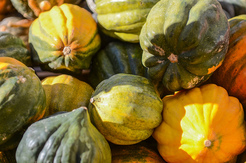
The best staple veggies are butternut squash, acorn squash, bell peppers, carrots, tomatoes, celery and cucumber. These vegetables were all picked because they are low in phosphorus, except for celery which has a moderate amount of phosphorus but has even more calcium. These vegetables were also picked because they have under 20 mg of oxalates per 100 grams of fresh vegetable. Oxalates block calcium absorption and high levels can be dangerous to reptiles. These vegetables are also low in goitrogenic compounds, which harm the thyroid.
Protein Packed Vegetables
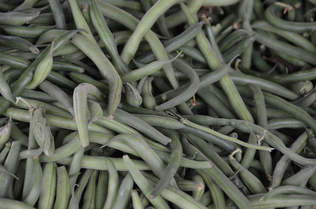
These vegetables are important for completely herbivorous reptiles or even reptiles that primarily eat plants. They all provide above the required amount of protein for herbivorous reptiles. Some protein vegetables are very healthy but need to be fed in moderation due to their high oxalate content. These include okra and snap peas. However these protein filled veggies are great because of their favorable phosphorus and calcium content. Broccoli and cauliflower make good protein sources, but should be fed in moderation due to their high content of goitrogenic compounds. Asparagus, green peas and cooked lentils are good protein sources, but all have relatively high phosphorus content. The very best protein packed vegetables are green beans they have almost no down side.
Occasional Vegetables
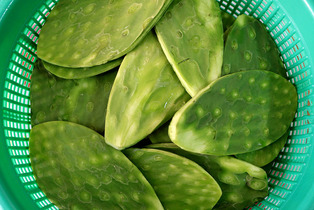
Pumpkin, mushroom and zucchini have a high enough phosphorus content and a poor enough calcium to phosphorus ratio that they should only be feed occasionally. They are otherwise incredibly healthy, just care should be taken to balance them with enough calcium supplement or calcium rich foods. Similarly sweet potato and leeks have low phosphorus but are high in oxalates, so should be fed in moderation. Nopal (prickly pear cactus pads) is generally considered a great staple food due to its high calcium content and good calcium to phosphorus ratio, but they are relatively high in oxalate content so should not be feed in conjunction with other high oxalate content foods.
Rare to Never Vegetables
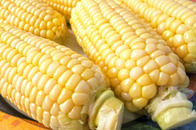
Corn and potato are high in simple starches and not a very natural food source for reptiles. Parsnip and turnips are extremely high in oxalates. Edamame and beets are high in both oxalates and goitrogens.
Toxic Vegetables
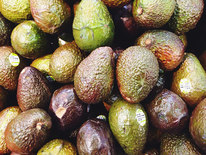
There are surprisingly few vegetables that humans eat that reptiles cannot. These include avocado, basal pear, cacao, coffee, eggplant, garlic and elderberry. These foods should be fed under no circumstances.
Nutrient Content of Vegetables
(Scroll right for full table) *not poisonous , but not considered healthy for reptiles
| Dry Matter Nutrient Analysis | |||||||||||||||||||||||||
| Asparagus | Green Beans | Broccoli | Cauliflower | Celery | Corn* | Cucumber | Garlic | Leek | Mushroom | Okra | Pumpkin | Peas | Bell Pepper | Potato* | Edamame* | Zucchini | Sweet Potato | Turnip | Carrot | Butternut Squash | Tomato | Omnivore | Herbivore | ||
| Crude Protein % | 32.4 | 18.6 | 26.2 | 24.4 | 15.2 | 13.3 | 14.6 | 15.5 | 8.8 | 40.8 | 20.4 | 14.3 | 25.5 | 12.8 | 9.7 | 41.5 | 22.2 | 7.0 | 11.1 | 7.7 | 7.4 | 16.4 | Crude Protein % | 20-25 | 17-26 |
| Crude Fat % | 1.5 | 1.0 | 3.7 | 1.2 | 4.3 | 5.0 | 2.1 | 1.2 | 1.8 | 3.9 | 1.0 | 1.2 | 1.9 | 3.8 | 0.5 | 19.0 | 3.7 | 0.4 | 1.2 | 1.7 | 0.7 | 3.6 | Crude Fat % | 3-6 | 3 |
| Crude Fiber % | 15.4 | 17.5 | 12.1 | 15.2 | 17.4 | 5.6 | 5.2 | 2.5 | 5.3 | 6.6 | 16.3 | 3.0 | 12.0 | 13.5 | 5.3 | 9.7 | 10.2 | 6.6 | 11.1 | 12.0 | 7.4 | 35.5 | Crude Fiber % | 20-35 | 6-10 |
| Calcium % | 0.353 | 0.381 | 0.439 | 0.268 | 0.870 | 0.008 | 0.333 | 0.437 | 0.347 | 0.039 | 0.827 | 0.290 | 0.118 | 0.090 | 0.058 | 0.242 | 0.278 | 0.132 | 0.370 | 0.282 | 0.353 | 0.182 | Calcium % | 1 | 1.100 |
| Phosphorus % | 0.765 | 0.392 | 0.617 | 0.537 | 0.522 | 0.371 | 0.500 | 0.370 | 0.206 | 1.132 | 0.643 | 0.607 | 0.509 | 0.333 | 0.275 | 0.649 | 0.704 | 0.207 | 0.333 | 0.299 | 0.243 | 0.436 | Phosphorus % | 0.6 | 0.600 |
| Potassium % | 2.971 | 2.155 | 2.953 | 3.695 | 5.652 | 1.125 | 3.063 | 0.969 | 1.059 | 4.184 | 3.092 | 4.690 | 1.151 | 2.705 | 2.034 | 1.944 | 4.852 | 1.485 | 2.358 | 2.735 | 2.588 | 4.309 | Potassium % | 0.4 | 0.5 |
| Sodium % | 0.029 | 0.062 | 0.308 | 0.366 | 1.739 | 0.063 | 0.042 | 0.041 | 0.118 | 0.066 | 0.082 | 0.014 | 0.024 | 0.051 | 0.029 | 0.024 | 0.185 | 0.242 | 0.827 | 0.590 | 0.029 | 0.091 | Sodium % | 0.2 | 0.2 |
| Magnesium % | 0.206 | 0.258 | 0.196 | 0.183 | 0.239 | 0.154 | 0.271 | 0.060 | 0.165 | 0.118 | 0.582 | 0.165 | 0.156 | 0.154 | 0.111 | 0.246 | 0.315 | 0.110 | 0.136 | 0.103 | 0.250 | 0.200 | Magnesium % | 0.2 | 0.15 |
| Manganese (ppm) | 29.41 | 20.62 | 18.69 | 24.39 | 21.74 | 8.33 | 20.83 | 41.06 | 29.41 | 0.00 | 102.04 | 11.90 | 18.87 | 12.82 | 9.66 | 40.32 | 37.04 | 13.22 | 12.35 | 8.55 | 14.71 | 18.18 | Manganese (ppm) | 150 | 70 |
| Zinc (ppm) | 73.53 | 20.62 | 37.38 | 36.59 | 21.74 | 20.83 | 41.67 | 28.99 | 5.88 | 65.79 | 61.22 | 47.62 | 56.60 | 38.46 | 14.49 | 52.42 | 55.56 | 13.22 | 37.04 | 17.09 | 14.71 | 36.36 | Zinc (ppm) | 130 | 80 |
| Iron (ppm) | 308.82 | 103.09 | 65.42 | 48.78 | 43.48 | 20.83 | 62.50 | 41.06 | 123.53 | 65.79 | 81.63 | 95.24 | 70.75 | 51.28 | 38.65 | 84.68 | 74.07 | 26.43 | 37.04 | 25.64 | 51.47 | 54.55 | Iron (ppm) | 200 | 100 |
| Copper (ppm) | 29.41 | 7.11 | 6.36 | 5.85 | 15.00 | 4.17 | 14.17 | 7.25 | 5.88 | 41.84 | 10.20 | 15.12 | 8.30 | 8.72 | 4.83 | 12.10 | 18.52 | 8.81 | 12.35 | 3.85 | 7.35 | 18.18 | Copper (ppm) | 15 | 10 |
| Selenium (ppm) | 0.34 | 0.06 | 0.23 | 0.07 | 0.09 | 0.03 | 0.06 | 0.34 | 0.06 | 1.22 | 0.07 | 0.04 | 0.08 | 0.01 | 0.01 | 0.00 | 0.04 | 0.03 | 0.09 | 0.01 | 0.04 | 0.00 | Selenium (ppm) | 0.3 | 0.3 |
| Riboflavin (ppm) | 14.71 | 10.72 | 9.35 | 12.20 | 21.74 | 4.17 | 10.42 | 2.42 | 2.94 | 52.89 | 10.20 | 13.10 | 6.23 | 12.82 | 2.42 | 12.10 | 18.52 | 4.41 | 6.17 | 4.96 | 3.68 | 3.47 | Riboflavin (ppm) | 8 | 5 |
| Pantothenic acid (ppm) | 44.12 | 26.29 | 56.07 | 85.37 | 43.48 | 33.33 | 62.50 | 14.49 | 5.88 | 196.97 | 20.41 | 35.48 | 0.19 | 38.46 | 14.49 | 20.16 | 37.04 | 35.24 | 24.69 | 23.33 | 29.41 | 6.94 | Pantothenic acid (ppm) | 60 | 25 |
| Niacin (ppm) | 147.06 | 75.67 | 56.07 | 60.98 | 65.22 | 70.83 | 20.83 | 16.91 | 23.53 | 474.61 | 102.04 | 71.43 | 98.58 | 128.21 | 53.14 | 36.29 | 92.59 | 26.43 | 49.38 | 84.02 | 88.24 | 6.94 | Niacin (ppm) | 100 | 90 |
| Vitamin B12 (ppm) | 0.00 | 0.00 | 0.00 | 0.00 | 0.00 | 0.00 | 0.00 | 0.00 | 0.00 | 0.01 | 0.00 | 0.00 | 0.00 | 0.00 | 0.00 | 0.00 | 0.00 | 0.00 | 0.00 | 0.00 | 0.00 | 0.00 | Vitamin B12 (ppm) | 0.025 | 0 |
| Choline (ppm) | 2353 | 1577 | 1748 | 5512 | 1326 | 958 | 1250 | 560 | 559 | 2276 | 1255 | 976 | 1340 | 718 | 585 | 2258 | 1759 | 542 | 1370 | 752 | 368 | 236 | Choline (ppm) | 3500 | 1200 |
| Folate (ppm) | 7.65 | 3.40 | 5.89 | 6.95 | 7.83 | 1.92 | 1.46 | 0.07 | 3.76 | 2.24 | 8.98 | 1.90 | 3.07 | 5.90 | 0.77 | 12.22 | 5.37 | 0.48 | 1.85 | 1.62 | 1.99 | 0.21 | Folate (ppm) | 6 | 0.8 |
| Thiamin (B1) (ppm) | 14.71 | 8.45 | 9.35 | 12.20 | 10.87 | 8.33 | 10.42 | 4.83 | 5.88 | 10.66 | 20.41 | 5.95 | 12.55 | 12.82 | 4.83 | 8.06 | 9.26 | 4.41 | 6.17 | 5.64 | 7.35 | 3.47 | Thiamin (B1) (ppm) | 5 | 5 |
| Pyridoxine (B6)(ppm) | 14.71 | 14.54 | 18.69 | 24.39 | 21.74 | 4.17 | 10.42 | 28.99 | 11.76 | 13.68 | 20.41 | 7.26 | 7.97 | 38.46 | 14.49 | 4.03 | 37.04 | 8.81 | 12.35 | 11.79 | 14.71 | 3.47 | Pyridoxine (B6)(ppm) | 10 | 6 |
| Vitamin A (IU/kg) | 111176 | 71134 | 58224 | 1585 | 97609 | 7792 | 21875 | 217 | 98059 | 0 | 38265 | 879167 | 36085 | 401410 | 97 | 40 | 37037 | 624890 | 0 | 1427778 | 781691 | 3750 | Vitamin A (IU/kg) | 15000 | 8000 |
| Vitamin E (ppm) | 161.76 | 42.27 | 74.77 | 12.20 | 65.22 | 4.17 | 0.00 | 2.42 | 52.94 | 1.32 | 40.82 | 126.19 | 6.13 | 205.13 | 0.00 | 28.23 | 18.52 | 13.22 | 0.00 | 56.41 | 102.94 | 13.89 | Vitamin E (ppm) | 134 | 134 |
| Water % | 93.2 | 90.3 | 89.3 | 91.8 | 95.4 | 76.0 | 95.2 | 58.6 | 83.0 | 92.4 | 90.2 | 91.6 | 78.8 | 92.2 | 79.3 | 75.2 | 94.6 | 77.3 | 91.9 | 88.3 | 86.4 | 94.5 | Water % | NA | NA |
Why This Chart is
|
Looking at a comparison of vegetables against the requirements of reptiles allows the benefits and
disadvantages of each food item to be weighed. It also allows for correct supplementation to overcome any nutritional shortcomings. Without understanding the actual nutritional content of foods, a proper diet cannot be created. |
Sources |
Nutritiondata. com
Nijboer, Joeke. Ed. Nutrition in Reptiles. Merck Veterinary Manual. 2015 (omnivore requirements) Allen, Mary E. and Olav T. Oftedale. Nutrition in Captivity. Biology, Husbandry and Medicine of the Green Iguana. 4:47-74 (2003). (herbivore requirements) http://www.wakehealth.edu/Urology/Kidney-Stones/Oxalate-Content-of-Foods.htm |